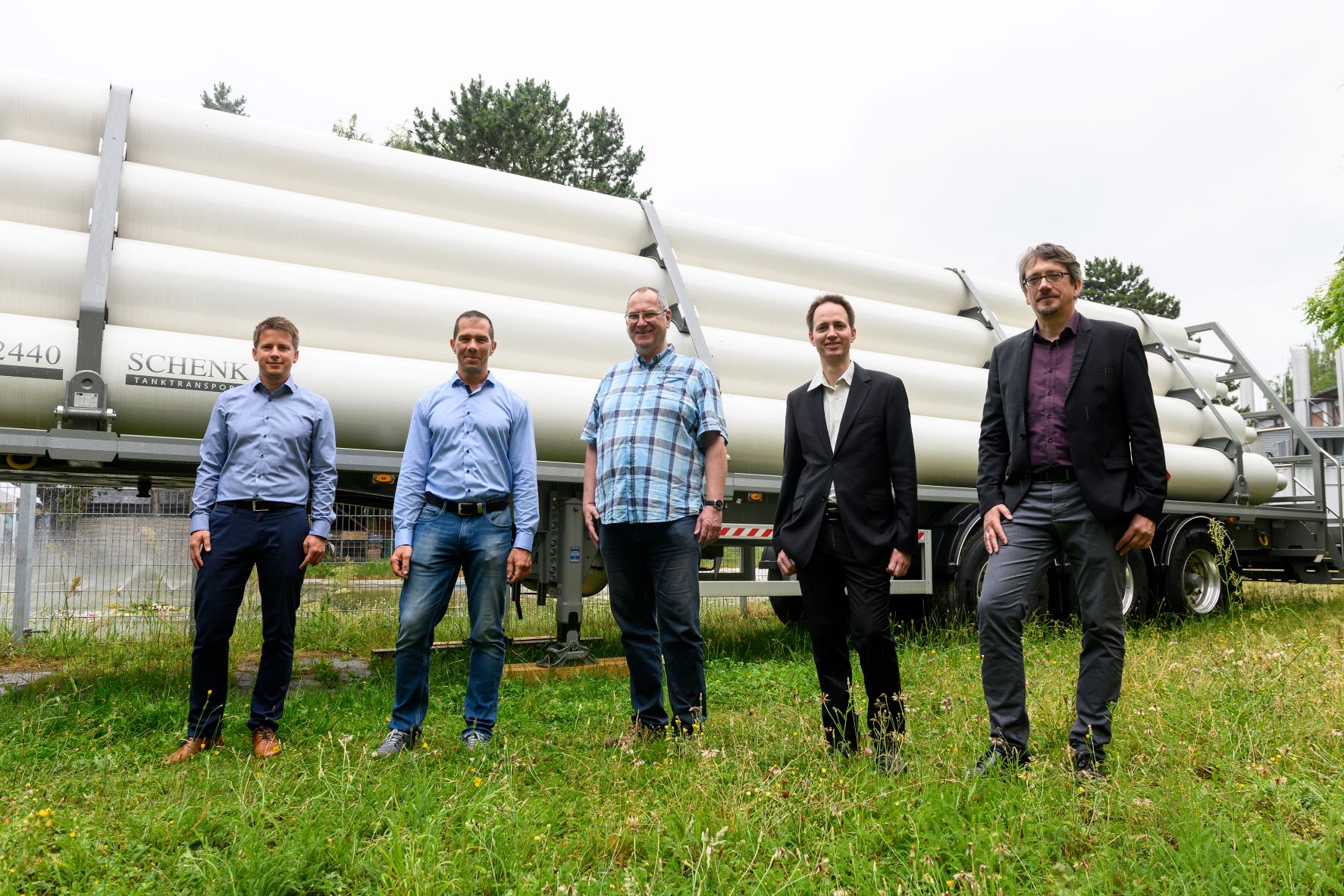DGMK-Project Lubricants
Investigation and testing of tailor-made lubricating oils for H2 applications
Professorship Piston Engines and Internal Combustion Engines:
Prof. Bert Buchholz, Dr. Ulrike Schümann, Dr. Fanny Langschwager, Tanja van Alphen
University of Rostock
Professorship of Technical Thermodynamics:
Prof. Karsten Müller, Dr. Dorian Holz, Riko Siewert, Matthis Richter
The use of hydrogen engines is an indispensable part of the energy transition and can provide a cost-effective and reliable alternative to fuel cell vehicles in many areas of application. However, as a gaseous and carbon-free fuel, hydrogen has very poor lubrication properties. This results in the following problems:
In contrast to fossil petrol, the hydrogen flame burns right up to the combustion chamber wall and attacks the lubricant film.
Furthermore, hydrogen in activated form can react with the lubricant molecules/additives, hydrogenate them and thus change their properties. This applies, for example, to the parameters viscosity, lubricity, foaming and low-temperature behaviour and can lead to a considerable change in the functionality/performance of the lubricating oil. In extreme cases, this can result in component and engine damage.
The water produced in large quantities during hydrogen combustion leads to further stress on the lubricating oil, which goes far beyond the level known from engines operated with fossil hydrocarbons. For example, more water is formed per kWh 56 % compared to methane operation. High water contents in the lubricating oil can cause corrosion, increased bearing wear and emulsion formation.
Furthermore, hydrogen can dissolve in the lubricating oil under the high pressure inside the engine, reduce the viscosity of the oil and thus impair the formation of the lubricating film. The higher the gas solubility, the higher the drop in viscosity of the oil. In addition to pressure and temperature, H2 solubility also depends on the polarity of the oil. Here, polar base oils, for example, could have an advantage, since the non-polar hydrogen is less strongly absorbed in these.
The pre-development of special lubricating oils/additives in this segment is often carried out by small and medium-sized enterprises. Through the database generated in the project, SMEs in the lubricating oil sector, but also analysis service providers or equipment manufacturers, will be given the opportunity to align their business fields in the direction of CO2-neutral fuels and sustainable lubricants. Through this project, these SMEs will gain access to the rapidly growing hydrogen market. Due to increasingly stringent exhaust gas legislation and political pressure with regard to climate-friendly mobility, this is a key element in ensuring the future viability of the industry.
In order to avoid performance variations and to achieve an optimum lubricating oil selection, the aim of the joint project is to simulate the lubricating oil stress in hydrogen operation as realistically and systematically as possible in the laboratory and to document and evaluate the observed lubricating oil changes. This will mainly be done on fully formulated engine oils. For certain questions, however, model oils (pure base oils, base oils specially doped with individual additives) are also to be used. The pre-selection of the test oils is carried out according to the following criteria:
- good water compatibility of all components
- high chemical resistance
- high wear protection
- balanced alkaline reserve (increased risk of corrosion in the H2-operation!)
- high oxidation stability / high thermal stability
- Stability against nitration
- sustainably producible, environmentally compatible, non-toxic
The following development goals are to be achieved:
- Determination of chemical-physical parameters (LTT)
- Gas solubilities, water solubility
- Measurement of density and viscosity as a function of water content as well as pressure and temperature
- Measurement of the interfacial tension oil/water
- Comparative studies of oil characteristics (LKV)
- Water absorption capacity/water separation capacity
- Oxidation resistance as a function of water content
- Nitration resistance
- Oil monitoring of a H2- Engine tests (LKV)
- Changes in water content, oxidation stability, oxidation and nitration (IR), density, viscosity, VI, acid number and element contents (wear metals, additive elements and impurities) compared to fresh oil
- Documentation of conspicuous wear and ignition phenomena
- Analysis and evaluation of lubricating oils from hydrogen applications from practice (BHKW, engine tests)
- Development of a preliminary catalogue of requirements for H2-lubricating oils (LTT and LKV)
- Selection criteria and oil recommendations
- appropriate test parameters and analytical methods for laboratory tests (including wear tests, corrosion tests and tests to assess the tendency to deposit)
- Test conditions for engine endurance tests including the required monitoring parameters
The IGF application has received the notification of funding from the BMWK. The research project started on May 1, 2023.

Federal Ministry of Economics and Climate Protection